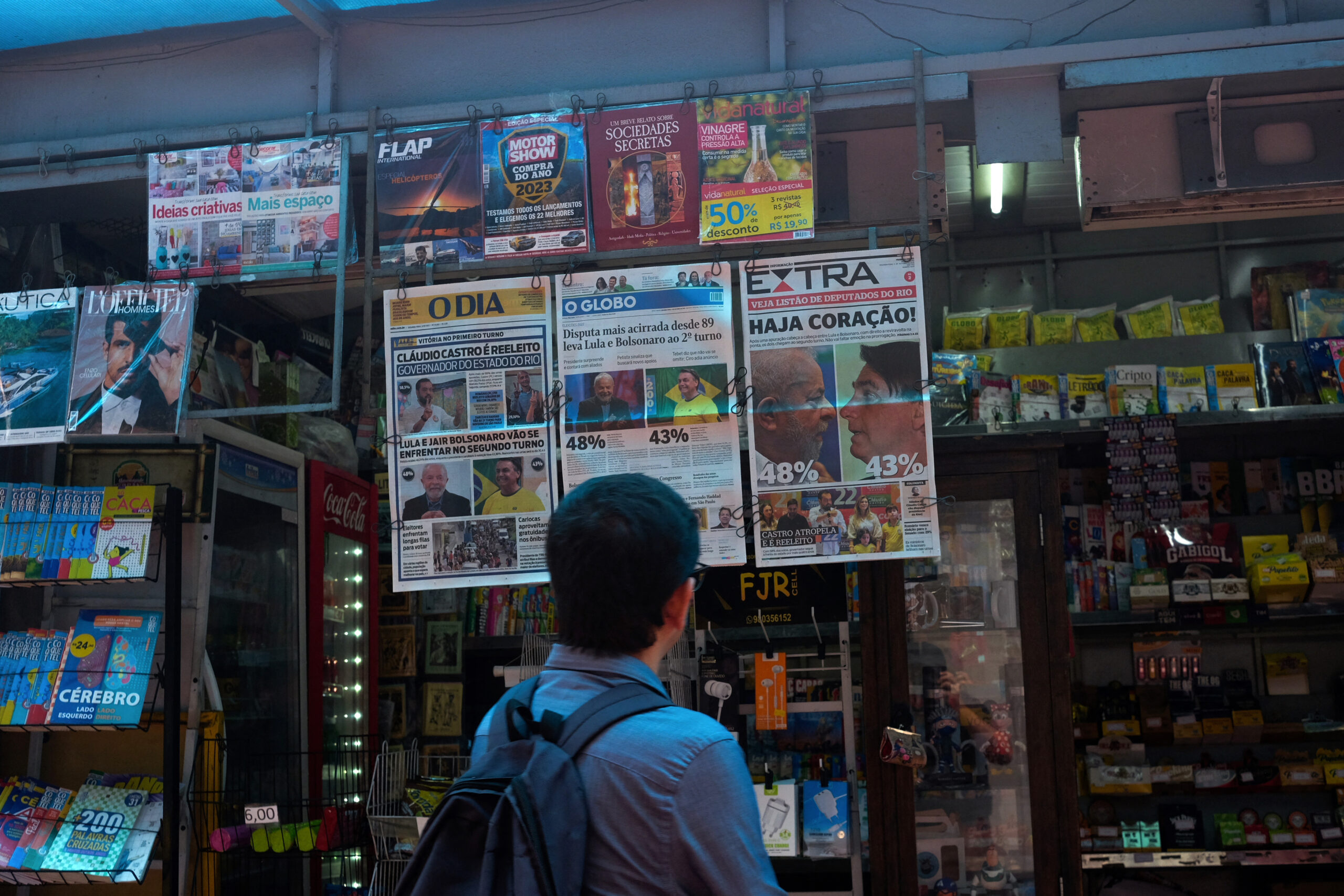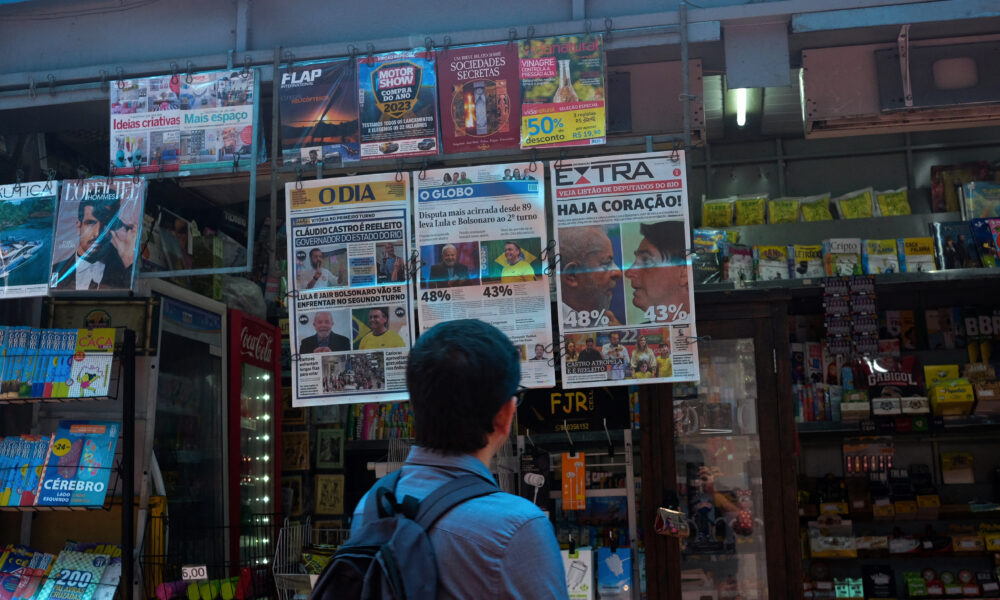International
Inconclusive vote: Brazil wakes up to four more weeks of uncertainty

AFP | Mariëtte Le Roux
After an inconclusive first round of presidential elections, Brazilians woke up Monday to another month of uncertainty in a deeply polarized political environment and with renewed fears of unrest.
Seeking to make a spectacular comeback, ex-president and frontrunner Luiz Inacio Lula da Silva, 76, failed to garner the 50 percent of votes plus one needed to avoid an October 30 runoff against far-right incumbent Jair Bolsonaro, 67.
Lula got 48.4 percent of the vote in Sunday’s first round, followed by Bolsonaro with a much closer-than-expected 43.2 percent that seemed to signal a high level of enthusiasm for his conservative brand of “God, country and family” politics.
Lula had gone into Sunday’s first round with 50 percent of polled voter intention, and Bolsonaro with 36 percent.
The divisive president’s surprise performance likely spells a difficult time ahead, analysts said.
“I think it will be a very stressful campaign,” Leonardo Paz, Brazil consultant for the International Crisis Group, told AFP.
“Bolsonaro and Lula will come… for each other, and I think Bolsonaro will double down on… saying that the system was against him.”
Bolsonaro has repeatedly sought to cast doubt on Brazil’s electronic voting system and has questioned the validity of opinion polls that have consistently placed him a distant second.
Now, with real-life results seeming to bear out his claims, “more people… may believe in what Bolsonaro is saying,” said Paz.
‘Emboldened’
The incumbent president has repeatedly hinted that he would not accept a Lula victory, raising fears of a Brazilian version of the riots last year at the US Capitol after former president Donald Trump refused to accept his election loss.
Bolsonaro “will be very emboldened,” by Sunday’s electoral performance, said Michael Shifter of the Inter-American Dialogue think tank.
“It will give him some momentum because he’s beaten the expectations… He will play on that the experts were wrong: ‘I’ve got the momentum and I’ll defy expectations again in the second round’.”
Late Sunday, Bolsonaro proclaimed to journalists: “We defeated the opinion polls’ lie.”
Passions will be high on both sides for the next four weeks.
Lula’s failure to pull off a first-round victory leaves Bolsonaro with “an extra month to cause turmoil in the streets,” political scientist Guilherme Casaroes of the Getulio Vargas Foundation’s (FGV) Sao Paulo School of Business Administration told AFP.
“Any kind of doubt that he casts upon the electoral system will work in his favor… demobilizing voters not to go vote for Lula.”
This would mean hammering on Lula’s flaws, including his controversial conviction for corruption — since overturned in court, but not necessarily in the court of public opinion — and the 18 months he spent in jail.
“Certainly he (Bolsonaro) is very capable of revving up his base and they could interpret that (as the all-clear) to go after Lula supporters… You can’t rule it out,” said Shifter.
“There’s just a lot of rancor and a lot of hate and a lot of distrust and it would not be surprising if some of that leads to some unrest,” he added.
Any violence, however, was likely to be in the form of isolated incidents and not organized, just like it has been so far, analysts said.
Headed for an upset?
Sunday’s election outcome also suggested Bolsonaro cannot be written off.
“Lula’s chances of being elected seem considerably slighter,” said Casaroes.
A ‘Bolsonarist’ wave energized by the first-round results “will boost the president’s campaign and may help demobilize the non-convinced voters of Lula.”
It also means Lula will have to “court centrists and even conservatives much more aggressively during the next four weeks,” said the FGV’s Oliver Stuenkel, possibly hurting his standing with more radical leftist supporters.
Conversely, the disappointing result for Lula supporters might also serve to fire them up ahead of the next round.
“People that perhaps did not… vote because they thought that Bolsonaro would lose… they might go” vote in the next round, said Paz.
Added Casaroes: “Those who really care for democracy in the country will have to get off the couch. Occupying the public space against a strengthened Bolsonarism may be difficult, but it is the only way to prevent Bolsonaro’s long-run authoritarian project from consolidating at all levels.”
International
Iran Reports 201 Dead, 747 Injured After U.S. and Israeli Strikes

The Iranian Red Crescent Society reported Sunday night (local time) that at least 201 people were killed and 747 injured following attacks carried out by Israel and the United States against the Islamic Republic.
A spokesperson for the humanitarian organization said more than 220 rescue teams have been deployed across affected areas and that relief operations are continuing without interruption. The official highlighted the difficulty of treating the large number of wounded and the urgent need for additional resources in impacted provinces.
Out of Iran’s 31 provinces, 24 have reported damage, according to a statement carried by the Isna news agency. This marks the first overall casualty toll released by Iranian state-affiliated media since the launch of the offensive.
Among the dead are 85 schoolgirls from a school in the southern city of Minab, according to the country’s judiciary. “The number of martyrs at the Minab girls’ school has risen to 85,” the local prosecutor’s office said, as quoted by the judiciary’s website, Mizan Online.
Iranian President Masud Pezeshkian described the attack as a “savagery” that “constitutes a new black page in the record of countless crimes committed by the aggressors.”
Meanwhile, the international community continues to monitor the situation closely amid concerns about possible further reprisals and the broader impact on Middle East stability, energy markets, and global security.
AFP noted that it was unable to independently verify the casualty figures or the circumstances surrounding the events.
International
Pope Leo XIV Urges End to ‘Spiral of Violence’ in Middle East

Pope Leo XIV on Sunday called for an end to the “spiral of violence” in the Middle East, following military strikes by the United States and Israel against Iran and subsequent retaliatory bombardments in the region.
“Faced with the possibility of a tragedy of enormous proportions, I urge the parties involved to assume their moral responsibility and stop the spiral of violence before it becomes an irreparable abyss,” the pontiff told the crowd gathered in St. Peter’s Square at the Vatican.
Speaking during the Angelus prayer, the U.S.-born pope said stability and peace cannot be achieved through threats or weapons. “Stability and peace are not built with reciprocal threats or with arms that sow destruction, suffering and death, but only through reasonable, sincere and responsible dialogue,” he declared.
The leader of the world’s 1.4 billion Catholics also called for diplomacy to “regain its role” amid escalating tensions.
In addition, the pope urged Afghanistan and Pakistan to urgently resume dialogue after several days of clashes between the two countries.
International
Security Council to Hold Emergency Meeting on Middle East Crisis

UN Secretary-General António Guterres on Saturday condemned the “military escalation in the Middle East” following attacks by the United States and Israel against Iran and Tehran’s retaliatory strikes, just hours before an urgent meeting of the UN Security Council.
“I call for the immediate cessation of hostilities and de-escalation,” Guterres said in a statement.
The Security Council is scheduled to meet on Saturday at 21:00 GMT (4:00 p.m. in New York) to address “the situation in the Middle East,” the United Nations announced.
The meeting, during which Guterres will deliver remarks, was convened at the request of France, Bahrain, Colombia, Russia and China, according to a diplomatic source.
-

 International4 days ago
International4 days agoFamily of “El Mencho” Seeks Return of Body After Deadly Military Operation
-

 International4 days ago
International4 days agoLarry Summers Steps Down from Harvard Role Amid Epstein Controversy
-

 International4 days ago
International4 days agoIran’s President Optimistic Ahead of Geneva Nuclear Talks with U.S.
-

 International4 days ago
International4 days agoBill Gates Admits “Serious Mistake” Over Epstein Ties
-

 International4 days ago
International4 days agoStephen Hawking Photo Appears in Newly Released Epstein Documents
-

 International3 days ago
International3 days agoCocaine Production Surges 34% in 2023 as Market Expands into Africa and Asia
-

 International3 days ago
International3 days agoFederal Judge Blocks Trump Policy Allowing Deportations to Third Countries
-

 International2 days ago
International2 days agoTrump Floats “Friendly Takeover” of Cuba Amid Rising Tensions
-

 International2 days ago
International2 days agoArgentina’s Senate Reviews Milei-Backed Labor Overhaul
-

 International3 days ago
International3 days agoClinton Accuses Republican Committee of Using Epstein Case to Shield Trump
-

 International1 day ago
International1 day agoSecurity Council to Hold Emergency Meeting on Middle East Crisis
-

 Sin categoría1 day ago
Sin categoría1 day agoTrump: ‘We Think It’s True’ Amid Claims Iran’s Supreme Leader Was Killed
-

 International9 hours ago
International9 hours agoPope Leo XIV Urges End to ‘Spiral of Violence’ in Middle East
-

 International9 hours ago
International9 hours agoIran Reports 201 Dead, 747 Injured After U.S. and Israeli Strikes






























